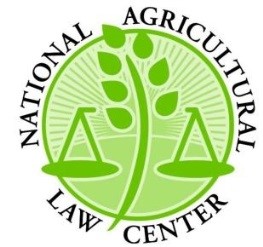A comprehensive summary of today’s judicial, legislative, and regulatory developments in agriculture and food. Email important additions to: camarigg at uark.edu
CASE LAW: Includes intervention, civil penalty, damages, and ESA issues.
Litchfield Hous. Trust, Inc. v. Inland Wetlands Comm’n of Town of Litchfield, No. LLICV166013425S, 2016 WL 3536564 (Conn. Super. Ct. June 9, 2016) concerned an administrative appeal involving three potential intervenors alleging unreasonable pollution and destruction of natural resources in the wetlands area of a proposed housing project. Court granted all three parties’ motions to intervene in the suit, but only in their capacity as “environmental intervenors.” The court emphasized, “proposed intervenors do not have to prove their case to be allowed to intervene; proposed intervenors must only allege sufficient facts, as opposed to legal conclusions, to support the inference of unreasonable pollution or destruction of natural resources.”
In UNITED STATES OF AMERICA, PLAINTIFF, v. LANZIE CARROLL HORTON, JR., DEFENDANT., No. 5:15-CV-2553, 2016 WL 3555451 (N.D. Ohio June 30, 2016), plaintiff sued regarding a fine by the USDA against defendant. Defendant sold dogs as a business, but operated without a license and claimed he was unable to pay fine. Court noted that “inability to pay is not one of the statutory factors that must be considered when determining the amount of civil penalty.”
In Delay v. Great Plains Custom Application, Inc., No. 113,197, 2016 WL 3570529 (Kan. Ct. App. July 1, 2016), plaintiff was awarded $20,000 in damages after suing defendant alleging negligent application of herbicides damaged their trees. Defendant appealed, contending district court erred when it instructed the jury on the “inherent value of trees.” Appellate court affirmed lower court noting, “when there is evidence that the damaged trees have a special inherent value or are essential to the value of the property as a whole, such that they might require replacement if damaged, then the replacement cost of the trees may be the appropriate measure of damages in a tort action.”
In TRACEY K. KUEHL, an individual; LISA K. KUEHL, an individual; KRIS A. BELL, an individual; NANCY A. HARVEY, an individual; JOHN T. BRAUMANN, an individual, and; ANIMAL LEGAL DEFENSE FUND, a non-profit corporation, Plaintiffs, vs. PAMELA SELLNER, an individual; TOM SELLNER, an individual; & CRICKET HOLLOW ZOO, a non-profit corporation, Defendants., No. C14-2034, 2016 WL 3582085 (N.D. Iowa June 28, 2016), plaintiffs claimed defendants violated the Endangered Species Act and wanted to enjoin defendants from acquiring or possessing lemurs, tigers, wolves, lions, and serval. Court granted relief regarding lemurs and tigers housed at Cricket Hollow Zoo, ordering defendants to transfer the animals in their possession “to an appropriate facility which is licensed by the USDA and is capable of meeting the needs of the endangered species.” Plaintiff’s motion for attorney fees denied.
REGULATORY: Includes USDA, FSA, RBCS, RHS, and RUS rules and notices.
AGRICULTURE DEPARTMENT: Notice USDA announces the re- establishment of the advisory Council for Native American Farming and Ranching. Info here.
FARM SERVICE AGENCY: Rule RHS amends regulations on Community Facility Direct Loans enabling the Agency to make loans to eligible lenders who can re-loan those funds to applicants for projects eligible under the Community Facilities Direct Loan program. Details here.
RURAL BUSINESS-COOPERATIVE SERVICE: Rule RHS amends regulations on Community Facility Direct Loans enabling the Agency to make loans to eligible lenders who can re-loan those funds to applicants for projects eligible under the Community Facilities Direct Loan program. Details here.
RURAL HOUSING SERVICE:
Rule RHS amends regulations on Community Facility Direct Loans enabling the Agency to make loans to eligible lenders who can re-loan those funds to applicants for projects eligible under the Community Facilities Direct Loan program. Details here.
Notice RHS amends the Community Facility Direct Loan regulations enabling the Agency to make loans to qualified Re-lenders who will loan those funds to applicants for projects serving high poverty areas eligible under the Community Facility Loan Program. Info here.
RURAL UTILITIES SERVICE: Rule RHS amends regulations on Community Facility Direct Loans enabling the Agency to make loans to eligible lenders who can re-loan those funds to applicants for projects eligible under the Community Facilities Direct Loan program. Info here.
